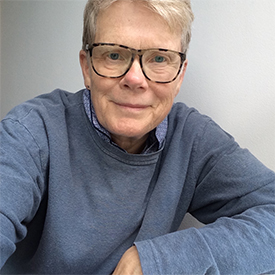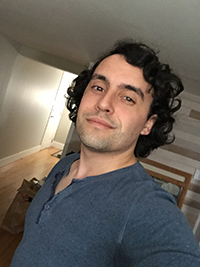Queer Perspectives: Tony Carter
in Conversation with Betsy Warland

Malahat volunteer Tony Carter recently spoke with Betsy Warland about their role as editor for the Malahat's upcoming Queer Perspectives issue. Alongside Ali Blythe and Trevor Corkum, Warland will read all submissions for consideration.
The issue will celebrate the aesthetics, concerns, contributions, and achievements of queer authors living in or from Canada, recognizing their crucial role in providing a truly complete picture of what it is like to be alive in North America in the past, future, and especially today.
Click here for full details on submitting to Queer Perspectives.
Queer identities are more broadly visible in modern North America than ever before, which allows spaces for queer stories that have not previously existed. Despite this increase in visibility, queer voices often do still struggle to be heard, especially queer people of colour. Similarly, due to its use as an umbrella term for a variety of different identities, some queer people have greater ease of access to this visibility than others. How do you feel about this issue, and how will it influence your work as a judge?
This “greater ease of access” is more variable and at the same time more rigid than one might expect: what worked against a queer writer three to four decades ago (I experienced this) is now enabling. Also, access, or lack of it, depends on other defining features of each queer writer such as one’s writing style, academic degree, race, gender, class, occupation, location, political view, etc. In some situations these features give you a leg up; in others they work against you. So, in order to take care of yourself it’s important to assess what dynamics are operative every time, then determine how to navigate it. This takes time to figure out and even then, one must continue the process. In my recent book, Oscar of Between — A Memoir of Identity and Ideas, I choose for myself a second given name (Oscar) and for the first time named my narrative position as “a person of between.” This took decades! You can recognize a narrative position and it may fit you for a while (until you evolve and change), or, from the outside it may fit the prevailing sociopolitical views for a while until they morph. As queer writers, we are on a lifelong quest. As a judge, I am looking for cues about each writer’s consciousness that in turn informs how and what they write. I am more interested in specificity than universality.
As a veteran mentor with the Vancouver Manuscript Intensive, you are no stranger to helping writers tell their stories, from finding what works and what can be enhanced, to what can be excised. What’s your process when evaluating a manuscript? Will that factor into the way you judge these entries?
I will answer this simply. Just as the exploration of our queer bodies provokes us to “make it new,” so does compelling queer writing. Everything matters! The narrative might be engaging but if the writer has given very little thought to what style, form, narrative position, and arc embodies that specific narrative, the piece will not lift off the page: you will forget what you read very quickly.
Anyone who has spent any amount of time writing creative nonfiction has likely been asked to explain what exactly the genre is, as it occupies a liminal space between fiction, poetry, and journalism, and can manifest in a variety of forms. Do you feel that this fluidity of genre lends itself well to stories concerned with queer perspectives? If so, has this factored into your own writing?
Yes, as queer writers we are inheritors of the “liminal space between fiction, poetry, and journalism.” This inheritance is what can make our writing so dynamic if we embrace it. Gender fluidity embodies this. With each piece I write, I am intrigued by discovering how to track and evoke the way perception and narrative actually happen in our minds and bodies. Perception (emotional, spiritual, sensual, intellectual) is synaptic: it currents freely between fiction, nonfiction, and poetry in a highly associative way. Genre is just that: a concept. It doesn’t reflect how narrative actually transpires within us. Creative nonfiction embraces this; embodies this.
Your memoir, Oscar of Between, deals with themes of queerness. For less experienced writers who are handling subjects related to their identity for possibly the first time, what is the most important advice you can offer?
Resist clichés of who and what you are expected to be as a queer person. Also, accept that you are on a lifelong quest, so take each step with your full attention and courage. Resist rushing. Rushing can result in cliché. It leads to coming out on the page in ways that you are not yet ready for emotionally, artistically, or socially. With my second book, open is broken, I came out on the page with erotic lesbian love poems and as a writer new on the scene (this was 1984), I experienced a quiet but fierce pushback for decades. Although it is a very different environment now, remember how long it took to come out to yourself; remember how long it took to come out to others, and trust that now you are going through that evolving process on the page.

Tony Carter
* * * * * * * *









